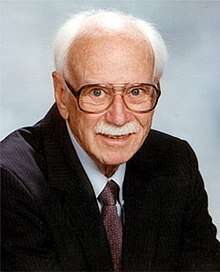H. Owen Reed
Herbert Owen Reed (June 17, 1910 – January 6, 2014) was an American composer, conductor and author.

Personal life
Reed was raised in rural Odessa, Missouri, where his first exposure to music was his father's playing of the old-time fiddle (accompanied by his mother at the piano).
Reed was married twice, for nearly fifty years to Esther, who proceeded him in death; and for 31 years to Mary, who traveled the world with him and survived him. He had two daughters, three step-children, fifteen grandchildren, and twenty-two great-grandchildren. Reed was an avid fisherman and world traveler.[1]
Education
In addition to his childhood with musically inclined parents, he was also attracted to the popular piano music of the 1920s (such as the novelty piano tunes of Zez Confrey), as well as his family's player piano, which played popular tunes. He studied piano with Odessa's only piano teacher, Mrs. Felts, who attempted to interest him in the music of Bach and Beethoven.
In 1937 he enrolled at the Eastman School of Music (studying composition with Howard Hanson and Bernard Rogers, conducting with Paul White, musicology with Howard Gleason, and music theory with Allen I. McHose), receiving a Ph.D. in composition in 1939. In 1942, at the Berkshire Music Center (Tanglewood), Massachusetts, he studied composition with Bohuslav Martinů, and contemporary music with Aaron Copland, Leonard Bernstein and Stanley Chappel. In the summer of 1947, he studied composition with Roy Harris at Colorado Springs, Colorado, and also attended lessons with Arnold Schoenberg.
Career
H. Owen Reed joined the faculty of Michigan State College in 1939. His career at MSU lasted for nearly 40 years. Reed retired from MSU in 1976. Upon his retirement, MSU granted the title of Professor Emeritus unto Reed. In addition to teaching courses on composition at MSU, Reed as also a member of a faculty ensemble called the "Geriatric Six."[2]
Many of Reed's students have gone on to fame as composers and arrangers, including Loris Chobanian, Clare Fischer, David Gillingham, Adolphus Hailstork, and David Maslanka.
Compositions
Just as Béla Bartók investigated the traditional music of Eastern Europe, North Africa, and Turkey, using these as inspirations for his own original works, Reed similarly devoted much study to the traditional music of North America. Many of his works feature material derived from the Mexican, Native American, Anglo-American and African American cultures, blended with contemporary idioms.
Reed's music is published by G. Schirmer, Warner Brothers, Ballerbach Music, Harrock Hall Music, Triplo Press, Allyn & Bacon, Boosey & Hawkes, Edwin A. Fleisher, EMI Mills, Neil A. Kjos, Ludwig and H. O. Reed Music.
Writings
In addition to his compositions, Reed published eight books on the subjects of musical composition and music theory. His scores, recordings, correspondence, and other papers have been deposited in the Michigan State University Manuscript Collection, in the Special Collections Unit of the Michigan State University Libraries.
Discography
- 2004: The Composer's Voice: H. Owen Reed (Piano)
Sources
- Anon. 2005. "H. Owen Reed Music". Lilaclane.com website. Accessed 12 November 2010.
- H O Reed Music Publications [n.d.]
- James, Richard S. 2001. "Reed, H(erbert) Owen". The New Grove Dictionary of Music and Musicians, second edition, edited by Stanley Sadie and John Tyrrell. London: Macmillan Publishers.
- Michigan State University Libraries. [n.d.] "H. Owen Reed Collection"
- Reed, H. Owen. 2009. "Welcome to the Home Page of H. OWEN REED, Composer Author Conductor". Michigan State University website. Accessed 12 November 2010.
- Steinke, Greg A. 2010. "Greg Steinke, biography Greg A. Steinke: Biography". Tierra Del Mar Music. Accessed 12 November 2010.
- Syler, James. 2001. "Interview with Dr. H. Owen Reed". Ballerbach.com (July). Accessed 24 August 2009.
- Anon., "H. Owen Reed: Obituary", Lansing State Journal (January 9, 2014).
- Anon., "H. Owen Reed: Obituary", Lansing State Journal (January 9, 2014).
External links
- CV, Compositions, Biography, links
- H. Owen Reed Collection page from Michigan State University Manuscript Collection, Special Collections Unit, Michigan State University Libraries website (accessed 7 September 2015).
- Berz, William L. 2004. "Considering H. Owen Reed. Tempo [magazine of the New Jersey Music Educators Association] 59, no. 1 (October): 22–24 (archive from July 11, 2010; accessed 7 September 2015).